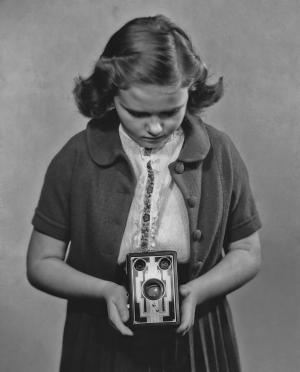At the BBC, Stephen Dowling argues that the Brownie by Eastman Kodak is the most important camera ever manufactured. Widely affordable (priced originally at just a buck) and easy enough for a child to use, the boxy machine brought photography to the masses, making the art portable and quotidian. The opening:
“Before it appeared in 1900, cameras were distinctly unwieldy, if not downright cumbersome. Early cameras tended to be made of a great deal of brass and mahogany and took pictures on to large glass or metal plates, often requiring exposure times measured in minutes.
To photograph far-flung places, porters and pack animals were often needed to carry the equipment. Photography was an activity involving patience, toxic chemicals, and brute strength. It was not something the ordinary people indulged in.
US inventor George Eastman took an important step forward in the 1880s, when he popularised a flexible film that did away with the need for weighty plates. His first ‘Kodak Camera’ went on sale in 1888, pre-loaded with enough film to take 100 photographs. When the last picture was taken, the entire camera was sent back to Kodak to be developed.
It was an uncomplicated box but it cost $25 – a significant amount of money. It was still a device for the wealthy.
The revolution came 12 years later. The Kodak Brownie, designed by Edward Brownell, looked similar to the original Kodak, but the film could be taken out of the camera after shooting and developed via Kodak stockists, chemists or even at home.
And Kodak sold the camera for the princely sum of $1 – you could buy the camera, a film and have that film processed for just $2. Photography had suddenly become not only portable but affordable, too, and the Brownie was easy to use.”
__________________________________
The Brownie in 1958:
Tags: George Eastman, Stephen Dowling

